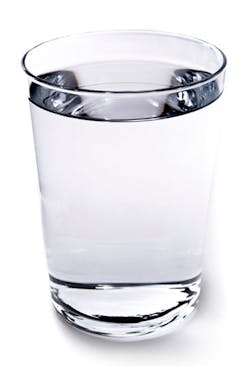Initial results from a scientific study on water consumption and cellular dehydration conducted at the Murad Research Labs in El Segundo, Calif., have uncovered surprising results, dramatically challenging and debunking the ages-old notion that everyone should drink “eight glasses of water per day.”
In an ongoing effort to gather and analyze data pertaining to healthy living, researchers at the Murad Research Labs, directed by Howard Murad, M.D., FAAD, measured the intracellular water levels of 104 women, revealing that those who regularly drink seven to eight cups of water per day actually have a lower average intracellular water level than those subjects who drink one to two cups of water per day.
The data collected shows that the women who drink one to two cups of water per day exhibit a 26.94 average intracellular water percentage, while those who drink seven to eight cups per day exhibit a 25.06 average intracellular water percentage. This means the subjects drinking less water are actually experiencing more successful whole-body cellular hydration than those drinking more water. As this is a measurement of hydration on a cellular level, even a small fraction of a percentage can make a substantial difference in terms of overall health. For example, the overall average intracellular water level in women aged 40 to 50 is 24.6 percent, while the average level in women aged 30 to 40 is 25.4 percent.
Another observation made by Dr. Murad was that the 40 to 50 year-old women studied by Murad Research Labs that were drinking less water actually have a cellular hydration level that matches average women that are 10 years younger.
“The myth that we must drink eight glasses of water per day actually comes from dated studies that have since proven to be off the mark as more data has been gathered over the years,” said Dr. Murad. “This newest data that we’ve gathered is significant because it demonstrates that drinking a large amount of water is in fact an ineffective method of whole body cellular hydration, despite what we’ve been taught in popular culture. In a nutshell, eight glasses of water means eight trips to the bathroom, flushing the system of vital nutrients and minerals. Working with and monitoring tens of thousands of subjects, we’ve seen that colorful raw fruits and vegetables are actually the best form of water for our cells as they provide structured water and antioxidants so that the hydration stays in the system longer.”
Dr. Murad added that the Murad Research Labs continue to collect data on whole body health and intracellular water measurements (data from more than 4000 patients of both sexes has already been collected) and will be revealing specific study results on the positive hydrating effects of eating raw fruits and vegetables when compared to drinking water later this year.
For those who have made it a regular practice to drink down those eight glasses per day, Dr. Murad suggests they not panic, but rather, make some simple changes.
“As part of our inclusive health philosophy at MIHMG, we’re telling our patients who are accustomed to drinking too much water to try to replace a few glasses per day with equivalent amounts of raw fruits or vegetables,” said Dr. Murad. “Colorful raw fruits and vegetables are packed with structured water – it’s the best form of water for your cells because it stays in your system longer and contains so many additional nutrients. Through proper nutrition, a person can help repair his or her cell membranes to attract and maintain more efficient intercellular water levels as well as help the body feel more hydrated overall.”
Murad Research Labs, founded in 1989, have determined intracellular water to be the ultimate biological marker of health and aging in both women and men, as they have found the younger and healthier someone is, the higher their intracellular water percentage will read. Murad Research Labs measures intracellular water in its patients with noninvasive bioelectrical body composition analyzing technology that checks for resistance and reactance so that fat and lean tissue as well as total body water can be accurately calculated.





